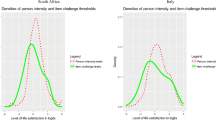Abstract
The aim of this paper was to validate the Brazilian-Portuguese version of the Satisfaction With Life Scale (SWLS), presenting evidence of its reliability and construct and criterion-related validity. A large Brazilian sample (2,180 participants), from five different populations (undergraduate and high school students, general population, elementary school teachers, and physicians), was considered. The results confirmed the single factorial structure and reliability (0.77 < Cronbach’s α < 0.88, mean α = 0.81) of the SWLS. Supporting its criterion-related validity, the SWLS correlated positively with positive affect and negatively with both negative affect and psychological distress across all five samples. The findings indicate that the Brazilian-Portuguese version of the SWLS is a valid instrument to use with diverse Brazilian samples.
Similar content being viewed by others
References
Abdallah, T. (1998). The Satisfaction With Life Scale (SWLS): Psychometric properties in an Arabic-speaking sample. International Journal of Adolescence and Youth, 7, 113–119.
Albuquerque, A. S., & Tróccoli, B. T. (2004). Desenvolvimento de uma escala de bem-estar subjetivo [Development of a subjective well-being scale]. Psicologia: Teoria e Pesquisa, 20, 153–164.
Arrindell, W. A., Heesink, J., & Feij, J. A. (1999). The Satisfaction With Life Scale (SWLS): Appraisal with 1700 health young adults in The Netherlands. Personality and Individual Differences, 26, 815–826.
Arrindell, W. A., Meeuwesen, L., & Huyse, F. J. (1991). The Satisfaction With Life Scale (SWLS): Psychometric properties in a non-psychiatric medical outpatients sample. Personality and Individual Differences, 12, 117–123.
Atienza, F. L., Balaguer, I., & García-Merita, M. (2003). Satisfaction With Life Scale: Analysis of factorial invariance across sexes. Personality and Individual Differences, 35, 1255–1260.
Atienza, F. L., Pons, D., Balaguer, I., & García-Merita, M. (2000). Propiedades psicométricas de la Escala de Satisfacción con la Vida en adolescentes [Psychometric properties of the Satisfaction With Life Scale in adolescents]. Psicothema, 12, 314–319.
Balatsky, G., & Diener, E. (1993). A comparison of the well-being of Soviet and American students. Social Indicators Research, 28, 225–243.
Blais, M. R., Vallerand, R. J., Pelletier, L. G., & Briere, N. M. (1990). L’echelle de satisfaction de vie: Validation canadienne-francaise du “Satisfaction With Life Scale” [The satisfaction scale: Canadian-French validation of the Satisfaction With Life Scale]. Canadian Journal of Behavioural Science, 21, 210–223.
Browne, M. W., & Cudeck, R. (1993). Alternative ways of assessing model fit. In K. A. Bollen, & J. S. Long (Eds.), Testing structural equation models (pp. 136–162). Newbury Park, CA: Sage.
Clark, L. A., & Watson, D. (1995). Constructing validity: Basic issues in objective scale development. Psychological Assessment, 7, 309–319.
Diener, E., Emmons, R. A., Larsen, R. J., & Griffin, S. (1985). The Satisfaction With Life Scale. Journal of Personality Assessment, 49, 71–75.
Fabrigar, L. R., MacCallum, R. C., Wegener, D. T., & Strahan, E. J. (1999). Evaluating the use of exploratory factor analysis in psychological research. Psychological Methods, 4, 272–299.
Fouquereau, E., & Rioux, L. (2002). Elaboration de l’Echelle de satisfaction de vie professionnelle (ESVP) en langue francaise: Une demarche exploratoire [Development of the French-language Professional Life Satisfaction Scale: An exploratory study]. Canadian Journal of Behavioural Science, 34, 210–215.
Gilman, R., & Huebner, E. S. (2001). Review of life satisfaction measures for adolescents. Behaviour Change, 17, 178–195.
Goldberg, D. P. (1972). The detection of psychiatric illness by questionnaire. London: Oxford University Press.
Gouveia, V. V., Chaves, S. S., Oliveira, I. C. P., Dias, M. R., Gouveia, R. S. V., & Andrade, P. R. (2003). A utilização do QSG-12 na população geral: Estudo de sua validade de construto [The use of the GHQ-12 in a general population: A study of its construct validity]. Psicologia: Teoria e Pesquisa, 19, 241–248.
Hong, S., Malik, M. L., & Lee, M.-K. (2003). Testing configural, metric, scalar, and latent mean invariance across sexs in sociotropy and autonomy using a non-Western sample. Educational and Psychological Measurement, 63, 636–654.
Hu, L., & Bentler, P. M. (1999). Cutoff criteria for fit indexes in covariance structure analysis: Conventional criteria versus new alternatives. Structural Equation Modeling, 6, 1–55.
Jöreskog, K. G. (1971). Simultaneous factor analysis in several populations. Psychometrika, 36, 409–426.
Jöreskog, K. G. (2004). On the chi-squares for the independence model and fit measures in LISREL. Retrieved September 26, 2007, from http://www.ssicentral.com/lisrel/techdocs/HowLargeCanaStandardizedCoefficientbe.pdf.
Jöreskog, K. G., & Sörbom, D. (1996). PRELIS 2: User’s reference guide. Chicago, IL: Scientific Software International.
Lewis, C. A., Shevlin, M. E., Bunting, B. P., & Joseph, S. (1995). Confirmatory factor analysis of the Satisfaction With Life Scale: Replication and methodological refinement. Perceptual and Motor Skills, 80, 304–306.
Lewis, C. A., Shevlin, M. E., Smekal, V., & Dorahy, M. J. (1999). Factor structure and reliability of a Czech translation of the Satisfaction With Life Scale among Czech university students. Studia Psychologica, 41, 239–244.
Lucas, R. E., Diener, E., & Suh, E. (1996). Discriminant validity of well-being measures. Journal of Personality and Social Psychology, 71, 616–628.
Marsh, H. W., Balla, J. R., & McDonald, R. P. (1988). Goodness of fit indexes in confirmatory factor analysis: The effect of sample size. Psychological Bulletin, 103, 391–410.
Martinez, J. C., Martinez, M. R., Garcia, J. C., Cortes, I. O., Ferrer, A. R., & Herrero, B. T. (2004). Fiabilidad y validez de la Escala de Satisfacción con la Vida de Diener en una muestra de mujeres embarazadas y puerperas [Reliability and validity of the Satisfaction With Life Scale of Diener in pregnant and puerperium women]. Psicothema, 16, 448–455.
McDonald, R. P. (1999). Test theory: A unified treatment. London: Lawrence Erlbaum.
McIntosh, C. N. (2001). Report on the construct validity of the Temporal Satisfaction With Life Scale. Social Indicators Research, 54, 37–56.
Neto, F. (1993a). Predictors of satisfaction with life among second generation migrants. Social Indicators Research, 35, 93–116.
Neto, F. (1993b). The Satisfaction With Life Scale: Psychometrics properties in an adolescent sample. Journal of Youth and Adolescence, 22, 125–134.
Neto, F. (2001). Satisfaction with life among adolescents from immigrant families in Portugal. Journal of Youth and Adolescence, 30, 53–67.
Nunnally, J. C. (1978). Psychometric theory (2nd ed.). New York: McGraw-Hill.
Pavot, W., & Diener, E. (1993). Review of the Satisfaction With Life Scale. Psychological Assessment, 5, 164–172.
Pavot, W., Diener, E., Colvin, C. R., & Sandvik, E. (1991). Further validation of the Satisfaction With Life Scale: Evidence for the cross-method convergence of well-being measures. Journal of Personality Assessment, 57, 149–161.
Pavot, W., Diener, E., & Suh, E. (1998). The Temporal Satisfaction With Life Scale. Journal of Personality Assessment, 70, 340–354.
Pons, D., Atienza, F. L., Balaguer, I., & García-Merita, M. L. (2000). Satisfaction With Life Scale: Analysis of factorial invariance for adolescents and elderly persons. Perceptual and Motor Skills, 91, 62–68.
Pons, D., Atienza, F. L., Balaguer, I., & García-Merita, M. L. (2002). Propiedades psicometricas de la Escala de Satisfacción con la Vida en personas de tercera edad [Psychometric properties of Satisfaction With Life Scale in elderly]. Revista Iberoamericana de Diagnóstico y Evaluación Psicológica, 13, 71–82.
Reis, H. T., Sheldon, K. M., Gable, S. L., Roscoe, J., & Ryan, R. M. (2000). Daily well-being: The role of autonomy, competence, and relatedness. Personality and Social Psychology Bulletin, 26, 419–435.
Sachs, J. (2004). Validation of the Satisfaction With Life Scale in a sample of Hong Kong University students. Psychologia, 46, 225–234.
Schimmack, U., Oishi, S., Furr, R. M., & Funder, D. C. (2004). Personality and life satisfaction: A facet-level analysis. Personality and Social Psychology Bulletin, 30, 1062–1075.
Schimmack, U., Radhakrishnam, P., Oishi, S., Dzokoto, V., & Ahadi, S. (2002). Culture, personality, and subjective well-being: Integrating process models of life satisfaction. Journal of Personality and Social Psychology, 82, 582–593.
Shevlin, M. E., Brunsden, V., & Miles, J. N. V. (1998). Satisfaction With Life Scale: Analysis of factorial invariance, mean structures and reliability. Personality and Individual Differences, 25, 911–916.
Shevlin, M. E., & Bunting, B. P. (1995). Confirmatory factor analysis of the Satisfaction With Life Scale. Perceptual and Motor Skills, 79, 1316–1318.
Steenkamp, J.-B. E. M., & Baumgartner, H. (1998). Assessing measurement invariance in cross-national consumer research. Journal of Consumer Research, 25, 78–90.
Suh, E., Diener, E., & Fujita, F. (1996). Events and subjective well-being: Only recent events matter. Journal of Personality and Social Psychology, 70, 1091–1102.
Trautwein, U. (2004). The temporal facet of life satisfaction. A German adaptation of the scale of Pavot, Diener, and Suh (1998). Diagnostica, 50, 182–192.
van de Vijver, F., & Leung, K. (1997). Methods and data analysis for cross-cultural research. Thousand Oaks, CA: Sage.
Van Hemert, D. A., van de Vijver, F. J. R., & Poortinga, Y. H. (2002). The Beck depression inventory as a measure of subjective well-being: A cross-national study. Journal of Happiness Studies, 3, 257–286.
Vautier, S., Mullet, E., & Jmel, S. (2004). Assessing the structural robustness of self-rated satisfaction with life: A SEM analysis. Social Indicators Research, 68, 235–249.
Vittersø, J., Biswas-Diener, R., & Diener, E. (2005). The divergent meanings of life satisfaction: Item response modeling of the Satisfaction With Life Scale in Greenland and Norway. Social Indicators Research, 74, 327–348.
Wagner, A., Ribeiro, L. S., Arteche, A. X., & Bornholdt, E. A. (1999). Configuração familiar e o bem-estar psicológico dos adolescentes [Family configuration and adolescents’ psychological well-being]. Psicologia: Teoria e Pesquisa, 12, 147–156.
West, S. G., Finch, J. F., & Curran, P. J. (1995). Structural equation models with nonnormal variables: Problems and remedies. In R. H. Hoyle (Ed.), Structural equation modeling: Concepts, issues, and applications. Thousand Oaks, CA: Sage.
Wilkinson, R. B., & Walford, W. A. (1998). The measurement of adolescent phychological health: One or two dimensions? Journal of Youth and Adolescence, 27, 443–455.
Author information
Authors and Affiliations
Corresponding author
Appendix: Brazilian-Portuguese Version of the Satisfaction With Life Scale (SWLS-BP)
Appendix: Brazilian-Portuguese Version of the Satisfaction With Life Scale (SWLS-BP)
INSTRUÇÕES. Abaixo você encontrará cinco afirmações com as quais pode ou não concordar. Usando a escala de resposta a seguir, que vai de 1 a 7, indique o quanto concorda ou discorda com cada uma; escreva um número no espaço ao lado da afirmação, segundo sua opinião. Por favor, seja o mais sincero possível nas suas respostas.
-
7 = Concordo totalmente
-
6 = Concordo
-
5 = Concordo ligeiramente
-
4 = Nem concordo nem discordo
-
3 = Discordo ligeiramente
-
2 = Discordo
-
1 = Discordo totalmente
-
1.
_____Na maioria dos aspectos, minha vida é próxima ao meu ideal.
-
2.
_____As condições da minha vida são excelentes.
-
3.
_____Estou satisfeito (a) com minha vida.
-
4.
_____Dentro do possível, tenho conseguido as coisas importantes que quero da vida.
-
5.
_____Se pudesse viver uma segunda vez, não mudaria quase nada na minha vida.
Rights and permissions
About this article
Cite this article
Gouveia, V.V., Milfont, T.L., da Fonseca, P.N. et al. Life Satisfaction in Brazil: Testing the Psychometric Properties of the Satisfaction With Life Scale (SWLS) in Five Brazilian Samples. Soc Indic Res 90, 267–277 (2009). https://doi.org/10.1007/s11205-008-9257-0
Received:
Accepted:
Published:
Issue Date:
DOI: https://doi.org/10.1007/s11205-008-9257-0




